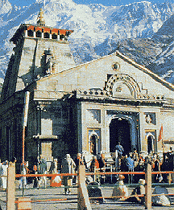|
Kedarnath, situated in the Garhwal Himalayas at a height of 10,500 ft.
above sea level, is in the Uttar Kashi district of the northern state
of Uttaranchal. Kedarnath with one of the 12 jyothir lingas of Shiva,
is amongst the premier pilgrimages in India. The uniqueness and greatness
of this temple is mentioned in the Vedas, Ithihaas and the Epics. It is
at the base of Mandakini river, in a valley two and half km, surrounded
by high snow covered mountains. Besides its religious significance, it
is also visited by those who love to conquer the rough terrain of Garhwal.
 According
to legend, the Pandavas sought Lord Shiva's blessings for redemption from
the sin of killing of Kauravas. But the Lord eluded them by taking the
form of a bull in Kedarnath and when followed further by the Pandavas,
he went down into the earth, leaving behind the hump there. This conical
protrusion about five feet by four feet or 'jyothirlingam' is worshipped
as the idol in the Kedarnath temple. Other parts emerged at four other
places: arms at Tungnath, face at Rudranath, belly at Madmaheswar and
the locks of hair with head at Kalpeshwar. All the five shrines are worshiped
as 'Panch Kedar'. According
to legend, the Pandavas sought Lord Shiva's blessings for redemption from
the sin of killing of Kauravas. But the Lord eluded them by taking the
form of a bull in Kedarnath and when followed further by the Pandavas,
he went down into the earth, leaving behind the hump there. This conical
protrusion about five feet by four feet or 'jyothirlingam' is worshipped
as the idol in the Kedarnath temple. Other parts emerged at four other
places: arms at Tungnath, face at Rudranath, belly at Madmaheswar and
the locks of hair with head at Kalpeshwar. All the five shrines are worshiped
as 'Panch Kedar'.
The original temple (now extinct ) with 12 Jyothirlingas,
was built by the Pandavas at the present site and Adi Sankaracharaya restored
the present Kedarnath temple. The Samadhi of Adi Sankaracharya lies behind
this temple. The statue of Nandi, the divine bull of Shiva, stands at
the entrance of the temple. Inside the temple, there are marvellous sculptures
of Kedaragouri, Krishna, Pandavas, Draupadi, Karthikeyan etc. The shrine
is covered by snow for 6 months in a year (closed from Oct-Nov up to Apr-May).
The statue is carried to Ukhimath, and is reinstated in Kedarnath in the
month of May.
The Bhairavnath temple, situated to the south
of the main temple of Kedarnath, is dedicated to Lord Bhairav, the deity
who guards the main temple in winter when it is closed.
|

